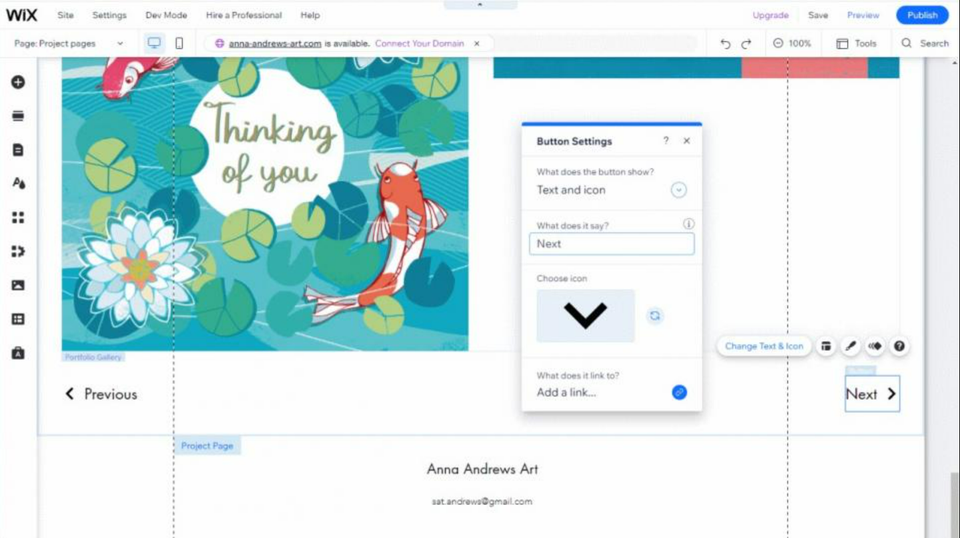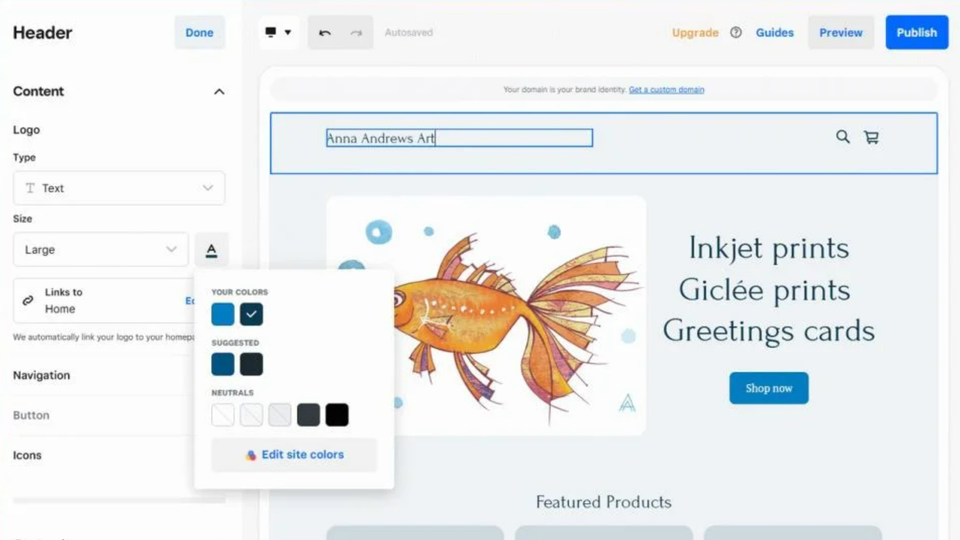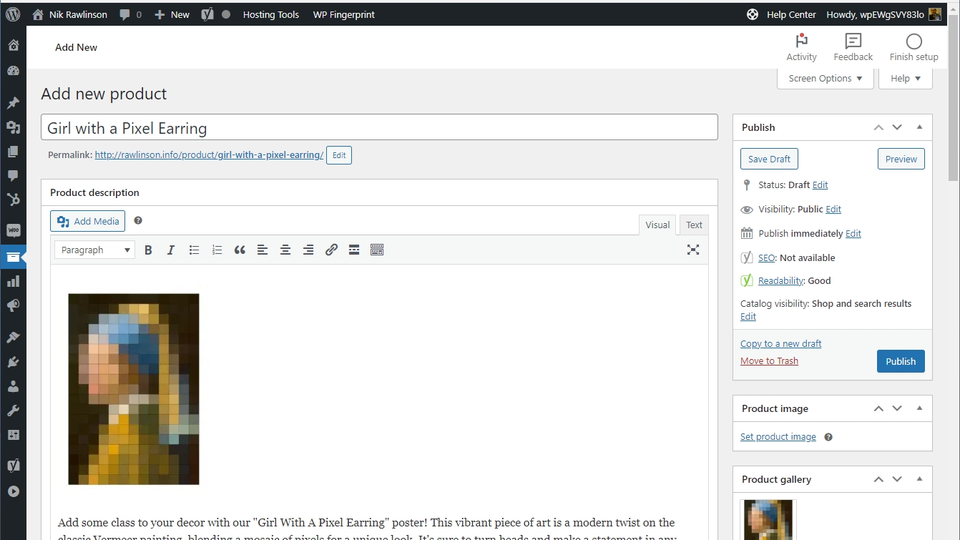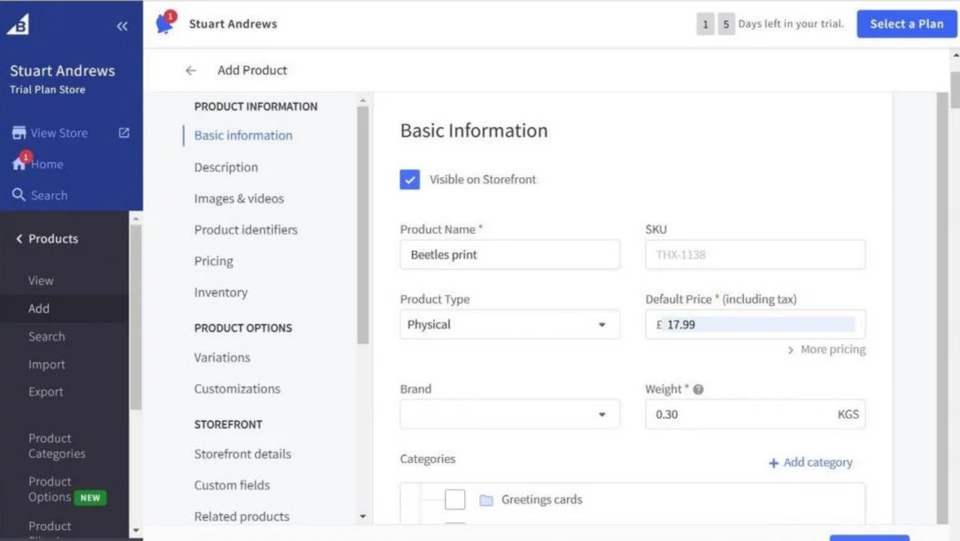
Get your products online and start selling with one of these comprehensive shopify alternatives for building a web-based store
There’s no shortage of excellent Shopify alternatives, but which one is best for you? Shopify is a formidable website builder, after all, so the alternative you choose needs to deliver a similar experience. It’s well supported, highly customisable and used by so many online retailers that there’s a large community of store owners on hand to help out if you become stuck.
Good news: our hands-on testing and extensive research can help you choose a worthy Shopify alternative. We’ve been busy putting the best website builders through their paces, and we’ve used the results of our tests to compile this list of top-notch Shopify replacements. Of course, you chould just choose Shopify – after all, it’s one of our favourite tools – but if you’re dead set on something more versatile, or indeed cheaper, read on.
Enjoy a 10% discount on all Wix plans until Monday
Don’t miss this chance to upgrade to a paid Wix plan for 10% less – you’ve only got until Monday to use code TAKE10 at checkout. Follow the link and sign in/log in to upgrade.
Wix 50% off View offers
Best Shopify alternatives: At a glance
- Best overall: Wix eCommerce
- Best for growing businesses: Squarespace Business
- Best for creatives: Big Cartel
How to choose the best Shopify alternative for you
What does Shopify offer?
Shopify plans start with the Basic tier, which costs £19/mth if you pay annually (annual plans benefit from a 25% reduction on the regular monthly price). For this, you can host an online store with an unlimited number of products, and take payments via credit or debit card, or third-party services such as PayPal. If you use Shopify’s own payment-processing platform, you’ll pay 2% commission on every transaction plus 25p for credit or debit card payments. Use a third-party payment processor, and you’ll still pay the 2%, but not the additional 25p.
Upgrading to the £49/mth Shopify plan, or £259/mth Advanced plan, trims these rates to 1.7% and 1.5% for credit and debit card payments respectively (each is also subject to the additional 25p per transaction) when processed by Shopify, and 1% and 0.5% respectively for payments made via third-party payment processors.
Whichever plan you choose, you can issue discount codes and gift vouchers, segment your customers, create subdomains for specific markets, segregate pricing by territory, and send automatic emails to customers who abandon their shopping carts.
If you only sell through social media, Shopify also has a dedicated Starter plan, which starts at £5/mth plus 5% transaction fees when using Shopify Payments. This buys you a simple storefront, unlimited product pages and a checkout. Should your store take off, you can upgrade to one of the plans outlined above.
How much should I pay for an online store?
You can get started for free, but be wary of hidden costs and discounts. A lot of paid plans are priced differently depending on whether you sign up for a month or a year, with discounts of up to 25% for annual commitments not uncommon.
On top of this, you’ll usually need to pay transaction fees to cover the cost of processing any sale. In some cases, you’ll have to pay these twice: once to the company hosting your online store and shopping cart, and once to the credit or debit card processor.
Keep an eye on how many transactions you’re processing every month and the cumulative cost, and calculate whether you could save money by upgrading to a more expensive tier that offers reduced or free transaction fees.
Do you need hosting and a domain?
Sign up for a year, and many store platforms will throw in a free domain. This is usually only free for your first year, however, so be sure to check the renewal costs from year two onwards. If you already have a domain you want to use, check whether there are any fees for connecting it to your store.
Are you tech-savvy?
If you’re comfortable installing and setting up the store yourself, you can integrate it with an existing site using a tool such as WooCommerce, combined with WordPress. However, this may also mean liaising with a hosting provider for web space and email.
If your talents lie elsewhere, such as in business, marketing or designing products, you might instead want to check out the all-in-one options that roll together hosting, comms and an integrated ecommerce platform.
We’ve covered both options here.
The best Shopify alternatives in 2023
1. Wix eCommerce: Best Shopify alternative overall
Price: From £0/mth | View offers at Wix
Wix eCommerce is a tiered offering: the more you pay, the more features you can use. So, if you’re just starting out, you can opt for the £14/mth Core plan, upgrading as you grow.
At that price, you get a free domain for your first year, 50GB of storage, and up to five hours of video that you can use to show off your products in their full glory. You can set up customer accounts, create plans and recurring charges, and accept payments online for an unlimited number of products. You can also sell subscriptions and memberships, and attract sign-ups with free trials and reduced-price plans.
On top of that, the Core plan allows you to set up a modest dropshipping business with up to 25 products at that price. If that feels a bit tight, and you want to list more, you’ll need to upgrade to Business (£20/mth) to up the limit to 250, or Business Elite (£119/mth) to remove the cap entirely. You’ll also need to upgrade to Business or above if you want to accept payment in multiple currencies.
The native Wix Payments tool can handle UK pound sterling, euros, US and Canadian dollars, Swiss francs and Brazilian real, with customers paying by credit or debit card or iDEAL. In each case, customers must spend a minimum of one unit (so, one pound, one euro and so on), and you’ll be charged a processing fee that varies by currency and payment method. For credit or debit card payments in pound sterling, you’ll be charged 2.1% plus 20p. For euros, it’s 1.9% of the transaction amount plus €0.30.
You don’t need any design skills if you’re happy to use one of Wix’s online store templates, of which there are more than 120 available. If none of them floats your boat, you can start with a blank site and work from there for complete flexibility.
Read our full Wix review for details
Key specs – Minimum term: One month; Shopping cart: Yes; Payment processing: Yes; Includes hosting? Yes
2. Squarespace Business: Best Shopify alternative for growing businesses
Price: From £17/mth (paid annually) | View offers at Squarespace
Squarespace has plans starting at £12 a month when you sign up for a year; however, you need to be on at least the Business tier, at £17 a month, to sell products and take payments. At that rate, you’ll be charged a 3% transaction fee on every sale, on top of any merchant fees charged by your credit or debit card processor. So, if things really take off, there may come a point where upgrading to the £23-per-month Commerce Basic, or £35-per-month Commerce Advanced plan, for which Squarespace doesn’t charge processing fees, is a money saver.
The Business tier includes hosting with unlimited bandwidth and, if you pay for a year up front, free custom domain registration for your first year. You can sell an unlimited number of products. However, if you want to host a checkout on your own domain, gather product reviews, sell on Facebook or set up customer accounts, you’ll need to opt for Commerce Basic. And if you want to sell subscriptions, use APIs or track abandoned carts and send automated emails enticing customers back to the checkout, you’ll need to be on Commerce Advanced.
You can design your own store from scratch or, if you’re not so savvy, use one of the pre-built templates, of which there are dozens to choose from, helpfully categorised by type. And, should you entice a sale, customers can settle up using PayPal or Stripe.
Read our full SquareSpace review for details
Key specs – Minimum term: One month; Shopping cart: Yes; Payment processing: Yes; Includes hosting? Yes
3. Square Online: Best Shopify alternative for smaller stores
Price: From £0 | View offers at Square Online
Unusually for an ecommerce provider, Square Online has a completely free tier that doesn’t restrict the number of products you can list; the only bill you’ll receive will be for payment processing, so if you sell nothing, you pay nothing. This should appeal to anyone who is just getting started with online selling and remains unsure whether their store will be a success.
However, there are good reasons to pick one of the charged-for tiers, which start with the £20/mth Plus plan. This incurs the same 1.4% plus 25p transaction fee for UK payments as the free tier, but includes a free domain for a year or the option to connect a domain you already own. You’ll also get more control over your site layout and branding with advanced customisation controls, embedding custom code, changing your site icon, and password protecting pages, for example. You’ll have access to advanced analytics to better understand your customers and can set up time-based categories, which will come in very handy if you’re running a business such as a food delivery site, for example, with different offers every day.
There is one further tier – Premium, at £64/mth – for which the primary benefit is a reduction in your transaction fees, to 1.4% plus 15p for UK cards. If you’re using in-house staff couriers to deliver products (again, something food delivery sites may do) then the 50p per order levied on the Free and Plus tiers to facilitate this is also waived here.
In general, we found the setup process straightforward thanks to good explanations accompanying more complex steps. There’s a good selection of themes to choose from, too, which can be customised within limits.
For any business that wants to launch an online store at minimal expense, Square Online is worth consideration. Although it isn’t the most versatile or customisable offering, you can get started for free and have a store up and running in less than half a day.
Read our full Square Online review for more details
Key specs – Minimum term: 1 year; Shopping cart: Yes; Payment processing: Yes; Includes hosting? Yes
4. WooCommerce: Best Shopify alternative for WordPress blogs
Price: From £0/mth | View offers at WooCommerce
WooCommerce has a significant advantage over competitors: not only is it designed to work within WordPress, currently the world’s most popular content management system, but it’s also developed by Automattic, the company behind WordPress itself. With WordPress powering around 40% of all websites, that makes WooCommerce one of the best-supported Shopify alternatives around.
At the heart of this open-source ecommerce platform is its WordPress plugin, which simplifies the task of building product pages, integrates a shopping cart, and connects the store to payment options such as credit cards, PayPal, Amazon Pay, Stripe and WooCommerce’s own payment tools, among others. If you choose to use WooCommerce Payments, you’ll be charged 1.4% plus 20p for each transaction, plus an additional 2% for an international payment or currency conversion.
Being so tightly integrated with WordPress means site owners can easily tweak the look and feel of their store by changing the site theme, or quickly add a store to a site they’ve been running for years without the need to undertake a structural redesign.
Another benefit of being an add-on to an existing product, rather than a stand-alone offering such as Shopify, is that it isn’t the developer’s primary source of income. Thus, if you’re selling physical products rather than downloads, you can get started for free. So, if you don’t make any sales, you pay nothing – which isn’t the case with Shopify; it charges £25 a month if you sign up for a month at a time, or £19 a month if you agree to a year up front.
Key specs – Minimum term: N/A; Shopping cart: Yes; Payment processing: Yes; Includes hosting? No
5. BigCommerce Essentials: Best Shopify alternative for ambitious small businesses
Price: From £0/mth | View offers at BigCommerce
BigCommerce Essentials plans start at $29.95 for the Standard option, then climb to $79.95 for the Plus plan and $299.95 for the top-end Pro plan, with discounts of 10% off Plus and Pro if you sign up to either for a year. For this, you get unlimited bandwidth to sell an unlimited number of products – and what you see is very much what you pay; BigCommerce doesn’t apply transaction fees on any of these tiers, although your payment processor may still take a cut itself.
Setup is easy if a little long-winded, involving a lot of form-filling, but there’s plenty of help available if needed, in the shape of how-to videos. Once you’re up and running, you can select from a limited range of free themes and customise them to a certain extent, or splash out on a third-party design if none of them quite meets your needs. Unfortunately, the back-end system isn’t entirely intuitive and your store may end up looking a little generic, but the different components are going to work well together and your site will look and feel like other successful stores. As we note in our full review, “this isn’t a tool for creative expression – it’s a tool for building sites that sell”.
Behind the scenes, its tools for handling products and inventory are impressive, and it should have no trouble handling a large number of products for a diverse store. However, it may be overkill for smaller sellers. It recommends using PayPal for taking payments, but can also integrate with Stripe, Barclaycard, Amazon, Apple, Google Pay and more.
While it’s up to you which tier you sign up to in the first place, BigCommerce may upgrade you – and thus charge you more – if your sales cross set thresholds. Standard is only available to stores with sales below $50,000; Plus is for those making up to $180,000, and Pro is for those that don’t exceed $400,000.
Read our full BigCommerce Essentials review for details
Key specs – Minimum term: 1 month; Shopping cart: Yes; Payment processing: Yes; Includes hosting? Yes
6. GoDaddy Ecommerce: Best Shopify alternative for paid appointments
Price: From £0 | View offers from GoDaddy
GoDaddy offers a wide range of regular web hosting plans, plus a dedicated Ecommerce tier. This starts at £13 a month, but to get that price you’ll need to sign up for at least a year. There’s also a monthly option at £20, and two- and three-year plans at £14 a month. It might seem illogical for the two- and three-year contracts to be more expensive than the one-year plan, but as prices increase to £20 a month across the board once your initial period expires, they actually represent considerable savings. If you were to stick with GoDaddy for three years, your total bill on the one-year plan would be £635, while on the two- and three-year tiers you’d be charged £575 and £503 respectively.
Whichever you sign up for, you get a free domain and SSL certificate, analytics and search engine optimisation. You can send up to 25,000 marketing emails every month to help promote your store, list products, manage shipping options, offer discounts, and run sales. You can take payment by credit card, PayPal, Apple Pay, and Google Pay, with transaction fees dependent on your chosen payment processor.
GoDaddy’s hosting plans include tools for booking and managing appointments, but only the Premium and Ecommerce plans allow you to set up recurring appointments, send email and text reminders, create group events or, crucially, take payment for appointments. For anyone selling services, such as hairdressing, legal advice or personal training, having such features built in makes GoDaddy Ecommerce a tempting proposition.
Read our full GoDaddy review for more details
Key specs – Minimum term: 1 month; Shopping cart: Yes; Payment processing: Yes; Includes hosting? Yes
